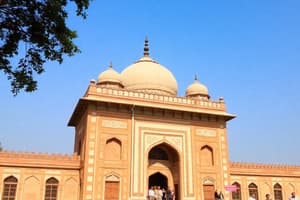Podcast
Questions and Answers
What was one of Aurangzeb's primary ambitions as emperor?
What was one of Aurangzeb's primary ambitions as emperor?
- To establish a democratic government
- To convert all Hindus to Islam
- To promote trade with European nations
- To expand the boundaries of the Mughal Empire into the Deccan (correct)
What notable action did Aurangzeb take in 1658?
What notable action did Aurangzeb take in 1658?
- Opened trade relations with the British
- Signed a treaty with the Marathas
- Deposed his father, Shah Jahan (correct)
- Established peace with Persian rulers
How did Aurangzeb's policies towards non-Muslims affect his rule?
How did Aurangzeb's policies towards non-Muslims affect his rule?
- They created significant controversy and debate (correct)
- They led to the immediate dissolution of the empire
- They completely alienated his Muslim supporters
- They were widely accepted and praised by all subjects
Which of the following was a significant external threat to the Mughal Empire during Aurangzeb's reign?
Which of the following was a significant external threat to the Mughal Empire during Aurangzeb's reign?
What characterizes Aurangzeb's personal demeanor as a ruler?
What characterizes Aurangzeb's personal demeanor as a ruler?
What resulted from the Battle of Panipat in 1761?
What resulted from the Battle of Panipat in 1761?
What was one of Aurangzeb's methods for maintaining rule over his empire?
What was one of Aurangzeb's methods for maintaining rule over his empire?
Which of the following best describes Aurangzeb's attitude towards his enemies?
Which of the following best describes Aurangzeb's attitude towards his enemies?
What was the main ambition of Aurangzeb as a ruler?
What was the main ambition of Aurangzeb as a ruler?
Why was the jizya tax controversial when reintroduced by Aurangzeb?
Why was the jizya tax controversial when reintroduced by Aurangzeb?
What significant construction project did Shah Jahan undertake in Delhi?
What significant construction project did Shah Jahan undertake in Delhi?
What was a direct consequence of Aurangzeb's heavy taxation policies?
What was a direct consequence of Aurangzeb's heavy taxation policies?
Which city served as Aurangzeb's base for directing his armies?
Which city served as Aurangzeb's base for directing his armies?
What approach did Aurangzeb take to achieve his military goals?
What approach did Aurangzeb take to achieve his military goals?
What was the impact of Aurangzeb's frequent absences from his capital?
What was the impact of Aurangzeb's frequent absences from his capital?
What was the initial purpose of the jizya tax during the earliest Islamic period?
What was the initial purpose of the jizya tax during the earliest Islamic period?
Flashcards are hidden until you start studying
Study Notes
Aurangzeb and the Decline of the Mughal Empire
- Aurangzeb (1618-1707) aimed to expand the Mughal Empire, emulating the Tughlaqs, but it led to increased instability and conflict.
- He deposed his father, Shah Jahan, in 1658 to claim the throne, marking the beginning of his reign.
- By the 1680s, the Marathas emerged as significant challengers to Mughal authority, threatening the empire's control.
- Aurangzeb's death in 1707 left the Mughal Empire weakened, with Maratha territory extending close to Delhi and southern Deccan.
- Key invasions weakened the empire further: Nadir Shah of Persia invaded in 1738-39, followed by a series of Afghan invasions led by Ahmad Shah Abdali starting in 1747.
- The Maratha army was decimated by Abdali at the Battle of Panipat in 1761.
Aurangzeb's Character
- Born on November 3, 1618, in Dahod, he was the youngest son of Shah Jahan and was known for his industrious and self-disciplined nature.
- A devout Muslim, Aurangzeb was ambitious in power but indifferent to wealth and comfort, often dressing simply.
- He was determined and ruthless toward enemies but could also be merciful, as noted by his supporter Khafi Khan regarding his use of punishment.
Rulership and Religious Policies
- Aurangzeb ruled strictly according to Islamic law, implementing controversial policies towards non-Muslims that sparked debate.
- He aimed to enforce moral behavior as per Islamic teachings and reintroduced the Islamic calendar.
- The Fatawa-al-Alamgiriya was produced under his council, providing a framework for Islamic law.
The jizya Tax
- The jizya tax, a differential tax on non-Muslims, was reinstated by Aurangzeb in 1679 after being abolished by Akbar.
- This tax faced backlash as it was perceived as a religious imposition and a means to fund Aurangzeb's military ambitions, despite earlier tax reductions.
Impact on the Mughal Empire
- Aurangzeb expanded the empire extensively but employed costly military campaigns that strained resources.
- His heavy taxation for military funding resulted in widespread hardship, contributing to public discontent.
- Frequent absences from the capital weakened his control over the empire, leading to corruption within the civil service and difficulty in governance.
- Ultimately, despite territorial expansion, the challenges he created destabilized the Mughal Empire in the long term.
Studying That Suits You
Use AI to generate personalized quizzes and flashcards to suit your learning preferences.




